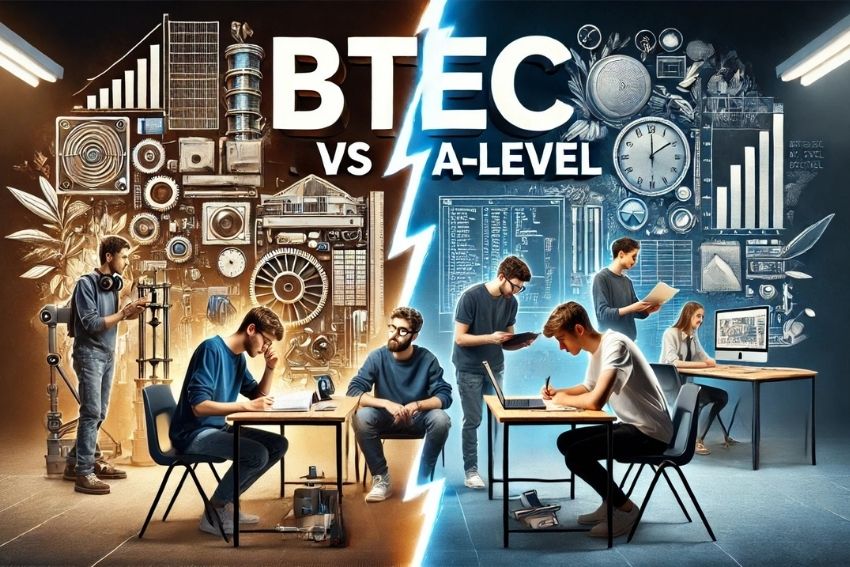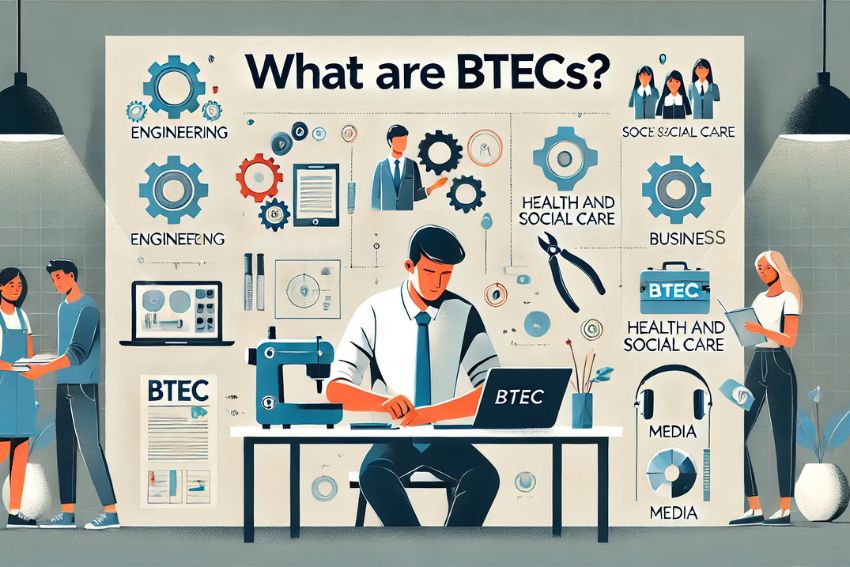BTEC vs A Level: A Complete Guide to Choosing the Right one
BTEC vs A Level is a common debate among students choosing their next step in education. Understanding the difference between BTECs and A Levels is essential when deciding which path suits you best. Both qualifications can lead to university, apprenticeships, or careers, but they have different learning styles, grading systems, and equivalents.
A BTEC diploma is equivalent to A Levels, but the approach to learning differs. While A Levels focus on exams and academic study, BTECs emphasise coursework and practical experience. Universities and employers accept both, but your choice should depend on your learning preferences and future goals.
This guide will break down BTEC vs A Level, covering grades, equivalents, and career opportunities to help you make an informed decision.

What is a BTEC?
A BTEC (Business and Technology Education Council) qualification is a career-focused alternative to A Levels, designed for students who prefer practical learning over exams. Unlike traditional academic courses, BTECs focus on hands-on experience, coursework, and real-world applications.
BTECs come in different levels:
- BTEC Level 2 – Equivalent to GCSEs, ideal for students looking to progress to further education or apprenticeships.
- BTEC Nationals (Level 3) – Equivalent to A Levels, widely accepted by universities and employers.
- BTEC Higher Nationals (Level 4/5) – Equivalent to the first year of university, offering specialised knowledge in industries like business, engineering, and healthcare.
If you prefer continuous assessment over final exams, a BTEC qualification might be the right fit for you.
What is an A Level?
A Levels (Advanced Levels) are academic qualifications studied in the UK, typically taken by students aged 16-18. They are the most common route to university and provide a strong foundation in theoretical knowledge across a wide range of subjects.
A Level qualifications focus on exam-based assessment, requiring students to develop critical thinking, problem-solving, and analytical skills. Most students take three or four A Level subjects, choosing from options like Maths, Science, English, and History.
Unlike BTECs, which emphasise practical coursework, A Levels rely on written exams at the end of the two-year course. Universities, especially Russell Group institutions, often prefer A Levels for more academic degrees like Medicine, Law, and Engineering.
If you enjoy theoretical learning, structured study, and preparing for final exams, A Level qualifications could be the best path for you.
Key Differences Between BTECs and A Levels
What is the difference between BTECs and A Levels? If you’re unsure which qualification suits you best, understanding how they differ in assessment, learning style, and structure can help you make the right choice.
BTEC vs A Level: Assessment Methods
One of the biggest differences is the assessement criteria. BTECs are mostly coursework-based, meaning you complete assignments, projects, and practical tasks throughout the course. In contrast, A Levels rely on final exams, which means your overall grade depends on how well you perform in a few major tests at the end of two years.
BTEC vs A Level: Learning Styles
In fact, BTECs focus on practical, hands-on learning, making them ideal if you prefer applying knowledge in real-world situations. A Levels, on the other hand, are more academic, requiring strong analytical and essay-writing skills. If you enjoy structured study, critical thinking, and theoretical concepts, AL evels might be the better fit.
BTEC vs A Level: Duration and Structure
Both qualifications typically take two years to complete, but the structure is different. A Level students study three or four subjects in-depth, leading to exams at the end. BTEC students complete a series of units, with grades awarded throughout the course based on coursework and practical assessments.
Choosing between BTECs and A Levels depends on how you learn best and what you want to do in the future.
BTEC VS A Level
| Category | BTEC | A Level |
| Learning Style | Practical, coursework-based | Theoretical, exam-focused |
| Assessment | Assignments, projects, and practical work | Final exams at the end of two years |
| Best for | Hands-on learners, career-focused students | Academic learners, university-focused students |
| Duration | Usually two years | Usually two years |
| Grading System | D* (Distinction*), D (Distinction), M (Merit), P (Pass) | A*, A, B, C, D, E |
| UCAS Points | varies by grade | varies by grade |
| University Acceptance | Accepted, but some competitive courses may prefer A-Levels | Preferred for traditional academic degrees |
| Examples of Subjects | Business, IT, Engineering, Health & Social Care | Maths, Science, English, History, Economics |
| Equivalent To | BTEC Level 3 = A Levels | A Levels = BTEC Level 3 |
Equivalent Levels and Grades
If you’re wondering how BTECs compare to A Levels, it’s important to understand their equivalents in qualification levels and grading systems. Both qualifications are widely accepted, but they follow different grading structures and assessment methods.
Qualification Levels: What Are They Equivalent To?
- BTEC Level 3 is equivalent to A Levels, meaning it carries the same weight for university admissions.
- BTEC Level 2 is equivalent to GCSEs, making it a stepping stone to further study.
- BTEC Higher Nationals (Level 4/5) are equivalent to the first year or two of university.
Grade Equivalents: BTEC vs A Level
BTEC grades and A Level grades use different systems, but they can be compared as follows:
- BTEC D (Distinction) = A Level A***
- BTEC D (Distinction) = A Level A
- BTEC M (Merit) = A Level C
- BTEC P (Pass) = A Level E
Since BTECs are graded based on coursework, students receive their grades across multiple units rather than through final exams. A Levels, however, rely on a final assessment, where one test can significantly impact the final grade.
Understanding BTEC and A Level grades helps students decide which qualification aligns with their strengths and future goals.
BTEC vs A Level: UCAS Points Comparison
When applying to university, both BTECs and A Levels contribute to your UCAS tariff points. These points help universities compare different qualifications and decide on entry requirements.
Each grade in BTECs and A Levels carries a specific number of UCAS points. While A Levels rely on exam performance, BTECs are assessed through coursework and practical assignments.
In reality, many universities accept BTECs and A Levels equally, but some courses, especially in highly academic fields like Medicine or Law, may prefer A Levels.

BTEC vs A Level: Pros and Cons of Each Qualification
So, choosing between BTECs and A Levels depends on how you prefer to learn and your future goals. To help you decide, here’s a breakdown of the difference between BTECs and A Levels, including their advantages and drawbacks.
BTECs: Practical and Career-Focused
Pros:
- Hands-on learning with practical coursework instead of final exams.
- Continuous assessment, meaning grades are built over time.
- Industry relevance, making it great for students who want career-focused qualifications.
Cons:
- Not always accepted for competitive university courses like Medicine or Law.
- Less theoretical depth, which may be a disadvantage for academic subjects.
A Levels: Academic and Exam-Based
Pros:
- Highly recognised by universities and employers worldwide.
- Strong theoretical foundation, ideal for academic and research-based degrees.
- Preferred for university entry, especially for competitive subjects.
Cons:
- Heavily exam-focused, with grades dependent on final tests.
- Less practical application, which may not suit students who prefer hands-on learning.
Both qualifications offer valuable skills, but the right choice depends on your learning style, career plans, and university aspirations.
BTEC vs A Level: Choosing the Right Path
Deciding between BTECs and A Levels depends on your career aspirations, learning style, and university plans. Both qualifications can lead to higher education, apprenticeships, or jobs, but the right choice depends on what suits you best.
Career Aspirations: Which Qualification Fits Your Goals?
If you already have a clear career goal, consider how each qualification aligns with it. BTECs are ideal for spheres like healthcare and business, IT, and engineering, where practical experience is valuable. A Levels are better suited for academic fields like Medicine, Law, and Sciences, where strong theoretical knowledge is essential.
BTEC vs A Level: Practical vs. Theoretical Learning
Your learning style plays a huge role in your decision. If you prefer coursework, hands-on projects, and practical tasks, a BTEC qualification might be the best option. If you enjoy structured study, research, and exams, then A Levels may be more suitable.
University Requirements: What Do You Need?
Some universities accept both BTECs and A Level qualifications, while others prefer A Levels for certain degrees. If you plan to attend university, check the entry requirements for your chosen course. Some Russell Group universities have stricter requirements, making A Levels the safer choice for competitive subjects.
Conclusion
To sum up, choosing between BTEC vs A Level is a big decision that depends on your goals, strengths, and learning style. Both qualifications provide great opportunities, but they are suited to different paths. If you’re curious about even more pathways beyond traditional options, explore A-Level alternatives that could better match your interests and ambitions.
If you prefer practical learning and coursework, a BTEC qualification can help you gain industry-specific skills. On the other hand, if you enjoy theoretical study and exam-based learning, A Level qualifications may be the better option, especially for university entry.
Before deciding, consider the difference between BTECs and A Levels, check university requirements, and think about your future career plans. Moreover, If you’re unsure, extra help from online tutors can provide valuable guidance to ensure you make the right choice.
Thus, no matter which path you choose, focus on your strengths, stay committed, and make the most of your learning journey!
FAQs:
What is a BTEC compared to A Level?
A BTEC qualification is a vocational, coursework-based alternative to A Levels. A Level qualifications are exam-focused and more academic, while BTECs offer practical learning, real-world projects, and continuous assessment.
What is a BTEC level equivalent to?
BTEC qualifications vary by level. BTEC Level 2 is equivalent to GCSEs, while BTEC Level 3 (National Diploma) is equivalent to A Levels. Higher Nationals (Level 4/5) are similar to the first year or two of university.
What is the BTEC grade equivalent to A Level?
BTEC and A Level grades are different but can be compared as follows:
BTEC D (Distinction) = A Level A*** BTEC D (Distinction) = A Level A BTEC M (Merit) = A Level C BTEC P (Pass) = A Level
Are BTECs easier than A Levels?
It depends on your learning style. BTECs are coursework-based, which means less pressure from final exams. However, they require consistent work throughout the course, making them just as challenging in their own way. A Levels rely on end-of-year exams, which some students may find harder.
How to compare A Level Business vs. BTEC Business?
A Level Business focuses on theoretical concepts, case studies, and exams, making it ideal for students who prefer traditional study. BTEC Business is more practical and coursework-based, offering hands-on experience that’s useful for careers in business and management
How many A Levels is a BTEC worth?
The BTEC Extended Diploma (Level 3) is equivalent to three A Levels. The BTEC Diploma is worth two A Levels, and the BTEC Subsidiary Diploma is equivalent to one A Level.








